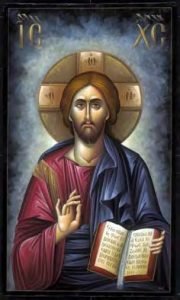 I have been sharing in this article the “sacramental” power of the Word of God, the Gospels. It is our tradition that the Gospel Book remains at all times on the Throne (i.e., altar). In the very beginning of the Divine Liturgy, the Word of God is invisible to us, yet it is ever present. This symbolizes how the Word was hidden from us during the period of the Old Covenant. After the Great Litany, the Gospel Book is brought solemnly from the altar area (i.e., the sanctuary) and carried through the midst of the assembly of believers. This is to symbolize the Word coming into the world. It is carried through the Assembly to symbolically lead believers back to God. The procession with the Gospel Book comes from the area of the church which represents heaven, carried through the nave, which represents the present world of faith, only to once again enter into the altar area. God came in His Word, His Son, to lead us back to Him – to His Kingdom. The Gospel Book is then once again enthroned on the Throne, there only to await the time when it is proclaimed to the Assembly.
I have been sharing in this article the “sacramental” power of the Word of God, the Gospels. It is our tradition that the Gospel Book remains at all times on the Throne (i.e., altar). In the very beginning of the Divine Liturgy, the Word of God is invisible to us, yet it is ever present. This symbolizes how the Word was hidden from us during the period of the Old Covenant. After the Great Litany, the Gospel Book is brought solemnly from the altar area (i.e., the sanctuary) and carried through the midst of the assembly of believers. This is to symbolize the Word coming into the world. It is carried through the Assembly to symbolically lead believers back to God. The procession with the Gospel Book comes from the area of the church which represents heaven, carried through the nave, which represents the present world of faith, only to once again enter into the altar area. God came in His Word, His Son, to lead us back to Him – to His Kingdom. The Gospel Book is then once again enthroned on the Throne, there only to await the time when it is proclaimed to the Assembly.
However enriching the Gospel reading or sermon about the reading may be, revelation of the divine Word remains incomplete before celebration of the Eucharistic mystery. As in the experience of the disciples at Emmaus, the gathered community only “perceives” the full revelation, it only opens its eyes to a true understanding and acceptance of the divine word, through a personal and intimate communion in the divine gifts of Christ’s Body and Blood. The Liturgy of the Word thus comes to fulfillment in and through the Liturgy of the Eucharist, the Mystery of Mysteries that alone has the power to transform the Word from a message about Jesus into a participation in His divine life.
This I believe is a very important point. The power of the Word of God, that is the Gospel, only become real when we have a real and personal relationship with Jesus Christ. Hopefully the reception of Communion, that is the Body and Blood of Christ, makes this transformation real in our lives. It is only when we truly feel one with Jesus Christ that we can come to really come to understand the Gospel – that is the Word of God.
The necessity of such a “eucharistic fulfillment” of the Word compels us to make ourselves worthy to receive Holy Communion. This requires that we find ways to “prepare” ourselves for the worthy reception of Communion.
A Lot to Think About
